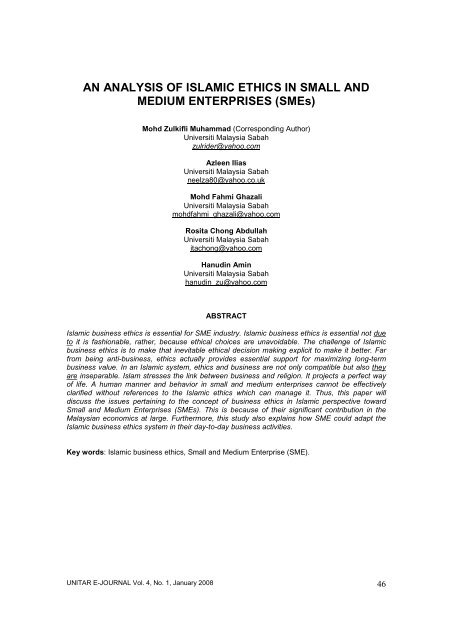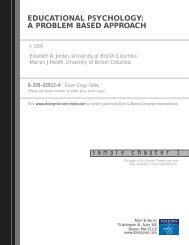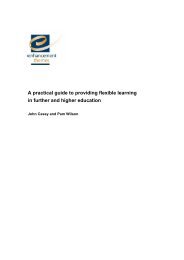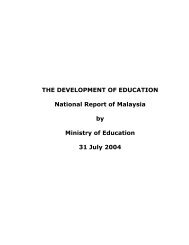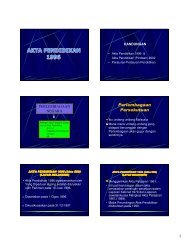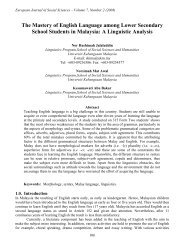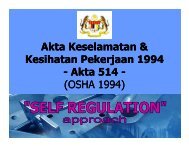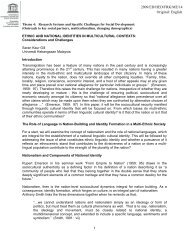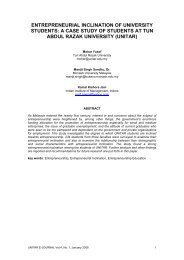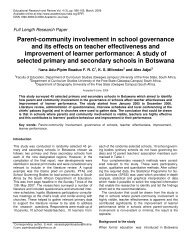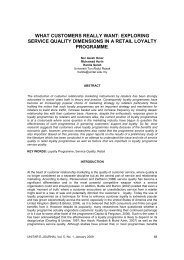An Analysis of Islamic Ethics in Small and Medium Enterprises (SMEs)
An Analysis of Islamic Ethics in Small and Medium Enterprises (SMEs)
An Analysis of Islamic Ethics in Small and Medium Enterprises (SMEs)
Create successful ePaper yourself
Turn your PDF publications into a flip-book with our unique Google optimized e-Paper software.
AN ANALYSIS OF ISLAMIC ETHICS IN SMALL ANDMEDIUM ENTERPRISES (<strong>SMEs</strong>)Mohd Zulkifli Muhammad (Correspond<strong>in</strong>g Author)Universiti Malaysia Sabahzulrider@yahoo.comAzleen IliasUniversiti Malaysia Sabahneelza80@yahoo.co.ukMohd Fahmi GhazaliUniversiti Malaysia Sabahmohdfahmi_ghazali@yahoo.comRosita Chong AbdullahUniversiti Malaysia Sabahitachong@yahoo.comHanud<strong>in</strong> Am<strong>in</strong>Universiti Malaysia Sabahhanud<strong>in</strong>_zu@yahoo.comABSTRACT<strong>Islamic</strong> bus<strong>in</strong>ess ethics is essential for SME <strong>in</strong>dustry. <strong>Islamic</strong> bus<strong>in</strong>ess ethics is essential not dueto it is fashionable, rather, because ethical choices are unavoidable. The challenge <strong>of</strong> <strong>Islamic</strong>bus<strong>in</strong>ess ethics is to make that <strong>in</strong>evitable ethical decision mak<strong>in</strong>g explicit to make it better. Farfrom be<strong>in</strong>g anti-bus<strong>in</strong>ess, ethics actually provides essential support for maximiz<strong>in</strong>g long-termbus<strong>in</strong>ess value. In an <strong>Islamic</strong> system, ethics <strong>and</strong> bus<strong>in</strong>ess are not only compatible but also theyare <strong>in</strong>separable. Islam stresses the l<strong>in</strong>k between bus<strong>in</strong>ess <strong>and</strong> religion. It projects a perfect way<strong>of</strong> life. A human manner <strong>and</strong> behavior <strong>in</strong> small <strong>and</strong> medium enterprises cannot be effectivelyclarified without references to the <strong>Islamic</strong> ethics which can manage it. Thus, this paper willdiscuss the issues perta<strong>in</strong><strong>in</strong>g to the concept <strong>of</strong> bus<strong>in</strong>ess ethics <strong>in</strong> <strong>Islamic</strong> perspective toward<strong>Small</strong> <strong>and</strong> <strong>Medium</strong> <strong>Enterprises</strong> (<strong>SMEs</strong>). This is because <strong>of</strong> their significant contribution <strong>in</strong> theMalaysian economics at large. Furthermore, this study also expla<strong>in</strong>s how SME could adapt the<strong>Islamic</strong> bus<strong>in</strong>ess ethics system <strong>in</strong> their day-to-day bus<strong>in</strong>ess activities.Key words: <strong>Islamic</strong> bus<strong>in</strong>ess ethics, <strong>Small</strong> <strong>and</strong> <strong>Medium</strong> Enterprise (SME).UNITAR E-JOURNAL Vol. 4, No. 1, January 2008 46
INTRODUCTIONCurrently, there exist many questions <strong>of</strong> why the global economy appears so unjust, with huge<strong>in</strong>come <strong>and</strong> wealth disparities <strong>and</strong> exploitation all too apparent. Rewards <strong>in</strong> bus<strong>in</strong>ess are too<strong>of</strong>ten unrelated to effort but rather the result <strong>of</strong> sharp practices (Hasanuzzaman, 2003). Thequestion <strong>of</strong> ethics has always attracted the <strong>in</strong>terest <strong>of</strong> scholars <strong>and</strong> others throughout the history<strong>of</strong> mank<strong>in</strong>d. In modern times, this question has occupied the attention <strong>of</strong> many countries, theirgovernments, societies <strong>and</strong> corporate communities. Bus<strong>in</strong>ess ethics has thus become a majorissue <strong>of</strong> debate for academicians, pr<strong>of</strong>essional associations, civil authorities <strong>and</strong> other relatedorganizations (Hanafi & Sallam, 1997).This is particularly important as the controversy <strong>in</strong> the Malaysian context today as there were alsoreported cases <strong>of</strong> unethical practices <strong>in</strong> religious affiliated <strong>in</strong>stitutions like the National PilgrimageBoard (LTH) <strong>and</strong> others. In the year 2003, top managers <strong>in</strong> the National Pilgrimage Board werenot spared with breach <strong>of</strong> trust <strong>in</strong> <strong>in</strong>vestment decisions. Such <strong>in</strong>cident demonstrated the extent<strong>and</strong> prevalence <strong>of</strong> unethical practices <strong>in</strong> Malaysia <strong>and</strong> elsewhere worldwide.As such, it is the purpose <strong>of</strong> this article to explore, analyze <strong>and</strong> synthesize the pert<strong>in</strong>ent verses <strong>in</strong>the Quran <strong>and</strong> the Hadith <strong>of</strong> Prophet Muhammad (p.b.u.h) <strong>in</strong> order to develop the essential ethicstheories <strong>in</strong> small <strong>and</strong> medium <strong>in</strong>dustries. A specific consideration is given to SME issues because<strong>of</strong> its significant role <strong>in</strong> <strong>in</strong>fluenc<strong>in</strong>g bus<strong>in</strong>ess environment as a whole.The first part <strong>of</strong> this article discusses on the concept <strong>of</strong> <strong>Islamic</strong> bus<strong>in</strong>ess ethics. The second partwill look at the specific issues on how SME should act ethically <strong>in</strong> the framework <strong>of</strong> <strong>Islamic</strong>bus<strong>in</strong>ess ethics.LITERATURE REVIEWBased on the <strong>in</strong>vestigations made by the researchers, there are several studies relevant todiscuss <strong>in</strong> this section. The follow<strong>in</strong>gs are the said studies:Beekun <strong>and</strong> Badawi (2005) exam<strong>in</strong>ed <strong>Islamic</strong> bus<strong>in</strong>ess ethics from a normative perspective. Theimportant f<strong>in</strong>d<strong>in</strong>g claimed that bus<strong>in</strong>ess ethics cannot be separated from ethics <strong>in</strong> the otheraspects <strong>of</strong> a Muslim’s daily life. The <strong>Islamic</strong> ethical system is balanced, fair, just <strong>and</strong> benevolent,<strong>and</strong> seeks to respect the rights <strong>of</strong> both primary <strong>and</strong> derivative stakeholders without allow<strong>in</strong>g forexploitation, nepotism <strong>and</strong> other human ills. Beekun <strong>and</strong> Badawi (2005) also claimed thatmank<strong>in</strong>d must not forget his/her role as God’s steward or vicegerent on earth. For Muslims thatunderst<strong>and</strong> <strong>and</strong> practice this ethical sysem, it is also conta<strong>in</strong>s its own enforcement. Not tomention, this study has looked at the balanc<strong>in</strong>g ethical responsibility from <strong>Islamic</strong> viewpo<strong>in</strong>t. Theissue <strong>of</strong> <strong>SMEs</strong> from <strong>Islamic</strong> bus<strong>in</strong>ess ethics is scarce to be found <strong>in</strong> the study, only the abovementioned extracted discussions are relevant to the current study. It is arguable here, Islam <strong>and</strong>bus<strong>in</strong>ess is related each others.A study conducted by Rice (1999) revealed that knowledge <strong>of</strong> ethics <strong>in</strong> practice is vital to the<strong>in</strong>ternational manager. Rice (1999) also discussed the bus<strong>in</strong>ess ethics among Egyptian people. Inmore detail, the illustration <strong>of</strong> Egypt shows considerable diversities between philosophy <strong>and</strong>practice; diversities which if understood, can provide a foreign executive with ideas on how tonegotiate with Egyptians <strong>and</strong> even what k<strong>in</strong>ds <strong>of</strong> products or services might be appreciated. Rice(1999) also mentioned about the importance <strong>of</strong> unity (tawhid), justice (adalah), trusteeship(khilafah) <strong>in</strong> deal<strong>in</strong>g with bus<strong>in</strong>esses.UNITAR E-JOURNAL Vol. 4, No. 1, January 2008 47
Accord<strong>in</strong>g to study reported by Abeng (1997), all bus<strong>in</strong>ess practices <strong>in</strong>volve explicit or implicitharm <strong>and</strong> <strong>in</strong>justice to the contract<strong>in</strong>g parties or to the public at large are disapproved by Islam.Further, <strong>in</strong> order to build a good bus<strong>in</strong>ess, any bus<strong>in</strong>esses must have a good Muslim bus<strong>in</strong>essleader that will drive the bus<strong>in</strong>ess <strong>in</strong>to lawful bus<strong>in</strong>ess as <strong>in</strong>tended by Shariah. Abeng (1997) alsonoted that there are six components needed to be understood by Muslim bus<strong>in</strong>ess leaders.Among others, are fulfillment <strong>of</strong> promises, exactness <strong>in</strong> weights <strong>and</strong> measures, truthfulness,efficiency, selection <strong>of</strong> merit <strong>and</strong> <strong>in</strong>vestigation <strong>and</strong> verification. By <strong>in</strong>corporat<strong>in</strong>g thesecomponents, all bus<strong>in</strong>ess practices will be treated as permissible as required by ShariahIslamiyyah. This study, <strong>in</strong>deed, provides general guidel<strong>in</strong>es for the current study <strong>in</strong> identify<strong>in</strong>gmeasures that better reflect <strong>SMEs</strong>.In this section, the researchers also discuss a number <strong>of</strong> survey based studies that producedmixed results <strong>and</strong> research implications. The follow<strong>in</strong>gs are some <strong>of</strong> many other studies exist <strong>in</strong>bus<strong>in</strong>ess ethics:A study conducted by Fulop et al. (2000) discovered there was no significant relationshipbetween the companies’ output <strong>and</strong> social responsibility. The comparison by <strong>in</strong>dustry <strong>in</strong>dicatedthat efficient resource management is important for the energy <strong>and</strong> process<strong>in</strong>g <strong>in</strong>dustries, while<strong>in</strong>novation is important for chemical <strong>and</strong> eng<strong>in</strong>eer<strong>in</strong>g companies <strong>and</strong> fair salaries <strong>and</strong> wages isimportant for the energy <strong>and</strong> construction companies. Fulop et al. (2000) also <strong>in</strong>dicated that therewas favorable reaction regard<strong>in</strong>g ethical codes, the ethical managers <strong>and</strong> committees, <strong>and</strong> theethical audit. In the implementation <strong>of</strong> ethical practices, communication problems with<strong>in</strong> thecompany, expected law changes, compla<strong>in</strong>ts <strong>of</strong> customers <strong>and</strong> changes <strong>in</strong> management <strong>and</strong>ownership played an important role. While implementation <strong>of</strong> ethical practices had positive resultsfor most <strong>of</strong> the companies, a few companies had a negative experience.A study conducted by Lee (1981) on ethical beliefs <strong>of</strong> the British <strong>and</strong> Ch<strong>in</strong>ese managers, <strong>and</strong>between the top management <strong>and</strong> middle management <strong>in</strong> the market<strong>in</strong>g management. In moredetail, found that there were no differences <strong>in</strong> the ethical st<strong>and</strong>ards <strong>in</strong> market<strong>in</strong>g between theBritish <strong>and</strong> Ch<strong>in</strong>ese managers <strong>in</strong> Hong Kong. Lee (1981) also believed that this was due toacculturation <strong>of</strong> the managers to local bus<strong>in</strong>ess practices.Among other purposes, Zabid (1989) study on bus<strong>in</strong>ess ethics among Malays, Ch<strong>in</strong>ese <strong>and</strong>Indian managers <strong>in</strong> the bank<strong>in</strong>g sector <strong>in</strong> Malaysia. Zabid (1989) <strong>in</strong>dicated there were differencesfound <strong>in</strong> bus<strong>in</strong>ess practices relat<strong>in</strong>g to "malpractices <strong>in</strong> sales" <strong>and</strong> "ga<strong>in</strong><strong>in</strong>g <strong>of</strong> competitor<strong>in</strong>formation". The Indian managers perceived these two bus<strong>in</strong>ess situations as more unethicalthan the Malays or Ch<strong>in</strong>ese. The Ch<strong>in</strong>ese managers perceived "malpractice <strong>in</strong> sales" as moreunethical than the Malays. The Ch<strong>in</strong>ese managers, however, perceived that "ga<strong>in</strong><strong>in</strong>g <strong>of</strong>competitor <strong>in</strong>formation" as less unethical than the Malays or Indian managers.DISCUSSIONThe Concepts <strong>of</strong> Bus<strong>in</strong>ess <strong>Ethics</strong> <strong>in</strong> <strong>Islamic</strong> Context<strong>Ethics</strong> <strong>in</strong> general can be def<strong>in</strong>ed as the system <strong>of</strong> rules govern<strong>in</strong>g the order<strong>in</strong>g <strong>of</strong> values(Bateman & Snell, 2002). <strong>Ethics</strong> also refers to the rightness or wrongness <strong>of</strong> the decisions <strong>and</strong>behaviors <strong>of</strong> <strong>in</strong>dividuals <strong>and</strong> the organizations <strong>of</strong> which they are a part (Hellriegel et. al, 2001).Bus<strong>in</strong>ess ethics sometimes referred to the moral pr<strong>in</strong>ciples <strong>and</strong> st<strong>and</strong>ards that guide behavior <strong>in</strong>the world <strong>of</strong> bus<strong>in</strong>ess.The aim <strong>of</strong> ethics is to identify both the rules that should govern people’s behavior <strong>and</strong> the“goods” that are worth seek<strong>in</strong>g. In fact, ethical issues <strong>in</strong>fluence the decision that employees makedaily. Some ethical issues <strong>in</strong>volve factors that blur the dist<strong>in</strong>ction between “right” <strong>and</strong> “wrong”. AsUNITAR E-JOURNAL Vol. 4, No. 1, January 2008 48
a result, employees may experience ethical dilemmas. Accord<strong>in</strong>g to Ferrell & Fraedrich (as cited<strong>in</strong> Bateman & Snell, 2002), an ethical issue is a situation, problem or opportunity <strong>in</strong> which an<strong>in</strong>dividual must choose among several actions that must be evaluated as right or wrong.From the <strong>Islamic</strong> context, the dimensions <strong>of</strong> ethics are numerous, far-reach<strong>in</strong>g <strong>and</strong>comprehensive. Ethical system <strong>in</strong> Islam derived from the teach<strong>in</strong>gs <strong>of</strong> the Quran <strong>and</strong> from theSunnah (i.e. recorded say<strong>in</strong>g <strong>and</strong> behavior <strong>of</strong> Prophet Muhammad, peace be upon him). <strong>Islamic</strong>ethics deals with all aspects <strong>of</strong> human life. It deals with relationships between man <strong>and</strong> Allah,man <strong>and</strong> his fellowmen man <strong>and</strong> other elements <strong>and</strong> creatures <strong>of</strong> the universe, <strong>and</strong> man his<strong>in</strong>nermost self (Hanafi & Sallam, 1997). Furthermore, the goals <strong>of</strong> Islam itself are not primarilymaterialistic. They are based on <strong>Islamic</strong> concepts <strong>of</strong> human well-be<strong>in</strong>g <strong>and</strong> good life thatemphasize brotherhood <strong>and</strong> socioeconomic justice <strong>and</strong> require a balanced satisfaction <strong>of</strong> bothmaterial <strong>and</strong> spiritual needs <strong>of</strong> all humans.Furthermore, Islam considers ethics as an <strong>of</strong>fshoot <strong>of</strong> imam (a Muslim belief system), <strong>and</strong> itemerges from the <strong>Islamic</strong> worldview <strong>of</strong> human life. <strong>Ethics</strong> also is known as akhlak. Akhlak is a set<strong>of</strong> <strong>Islamic</strong> moral values which have been prescribed fundamentally <strong>in</strong> the Quran <strong>and</strong> implementedby Prophet Muhammad (p.b.u.h) dur<strong>in</strong>g his life.Pr<strong>in</strong>cipally, there are two (2) types <strong>of</strong> akhlak, good or mahmudah <strong>and</strong> bad or mazmumah. Islamemphasizes the important <strong>of</strong> practic<strong>in</strong>g good akhlak (mahmudah) <strong>in</strong> all aspect <strong>of</strong> human life <strong>and</strong>recognizes it as one <strong>of</strong> the purpose <strong>of</strong> send<strong>in</strong>g His messengers (Shaharudd<strong>in</strong>, 2005). ProphetMuhammad (p.b.u.h) said: “I have been sent only for the purpose <strong>of</strong> perfect<strong>in</strong>g the qualities <strong>of</strong>good akhlak” (Imam Malik). Beekun (1997) mentioned that the term most closely related to ethics<strong>in</strong> the Quran is khuluq. Allah says <strong>in</strong> the Quran:“<strong>An</strong>d thou (st<strong>and</strong>est) on an exalted st<strong>and</strong>ard <strong>of</strong> character.” (68:4).The Quran also uses a whole array <strong>of</strong> terms to describe the concept <strong>of</strong> goodness such as khayr(goodness), birr (righteousness), qist (equity), ‘adl (equilibrium <strong>and</strong> justice), haqq (truth <strong>and</strong> right),ma’ruf (known <strong>and</strong> approved) <strong>and</strong> taqwa (piety). Pious actions are described as salihat <strong>and</strong>impious actions are described as sayyiat.<strong>Small</strong> <strong>and</strong> <strong>Medium</strong> <strong>Enterprises</strong> (<strong>SMEs</strong>)Accord<strong>in</strong>g to <strong>Small</strong> <strong>and</strong> <strong>Medium</strong> Industries Development Corporation (SMIDEC), an enterprise isconsidered an SME <strong>in</strong> each <strong>of</strong> the representative sectors based on the <strong>An</strong>nual Sales Turnover orNumber <strong>of</strong> Full Time Employees. <strong>SMEs</strong> are divided <strong>in</strong>to two sectors; manufactur<strong>in</strong>g,manufactur<strong>in</strong>g related services <strong>and</strong> agriculture <strong>in</strong>dustries; <strong>and</strong> services (<strong>in</strong>clud<strong>in</strong>g ICT) <strong>and</strong>primary agriculture.UNITAR E-JOURNAL Vol. 4, No. 1, January 2008 49
Table 1Category <strong>of</strong> <strong>Small</strong> <strong>and</strong> <strong>Medium</strong> <strong>Enterprises</strong> (<strong>SMEs</strong>)Category Sector Def<strong>in</strong>itionMicromanufactur<strong>in</strong>g, manufactur<strong>in</strong>g Sales Turnover less than RM<strong>Enterprises</strong>related services <strong>and</strong> 250,000 OR less than 5<strong>Small</strong><strong>Enterprises</strong><strong>Medium</strong><strong>Enterprises</strong>agriculture <strong>in</strong>dustriesservices (<strong>in</strong>clud<strong>in</strong>g ICT) <strong>and</strong>primary agriculturemanufactur<strong>in</strong>g, manufactur<strong>in</strong>grelated services <strong>and</strong>agriculture <strong>in</strong>dustriesservices (<strong>in</strong>clud<strong>in</strong>g ICT) <strong>and</strong>primary agriculturemanufactur<strong>in</strong>g, manufactur<strong>in</strong>grelated services <strong>and</strong>agriculture <strong>in</strong>dustries;services (<strong>in</strong>clud<strong>in</strong>g ICT) <strong>and</strong>primary agricultureemployeesSales Turnover less than RM200,000 OR less than 5employeesSales Turnover between RM250,000 to less than RM 10million OR employeesbetween 5 – 50Sales Turnover between RM200,000 to less than RM 1million OR employeesbetween 5 - 19Sales Turnover between RM10 million to RM 25 million ORemployees between 51 – 150Sales Turnover between RM 1million to RM 5 million ORemployees between 20 - 50Furthermore, accord<strong>in</strong>g to Department <strong>of</strong> Statistics, Malaysia; the distribution, establishment bysector are divided <strong>in</strong>to three; manufactur<strong>in</strong>g, services <strong>and</strong> agriculture. The most highestdistribution is from service (87.9%), followed by agriculture (7.1%) <strong>and</strong> manufactur<strong>in</strong>g (5%).Table 2Distribution <strong>of</strong> establishments by sectorsSectorNo. <strong>of</strong>%establishmentsManufactur<strong>in</strong>g 85,946 5.0Services 1,523,842 87.9Agriculture 123,762 7.1Total 1,733,550 100.0<strong>Small</strong> <strong>and</strong> <strong>Medium</strong> Enterprise (<strong>SMEs</strong>) <strong>and</strong> Bus<strong>in</strong>essThis study attempts to explore the concept <strong>and</strong> the approach <strong>of</strong> bus<strong>in</strong>ess ethics <strong>in</strong> <strong>Islamic</strong>perspective focus<strong>in</strong>g especially <strong>in</strong> <strong>Small</strong> <strong>and</strong> <strong>Medium</strong> <strong>Enterprises</strong> (<strong>SMEs</strong>). It is important toqualitatively analyse the important <strong>of</strong> bus<strong>in</strong>ess ethics for <strong>Small</strong> <strong>and</strong> <strong>Medium</strong> <strong>Enterprises</strong> (<strong>SMEs</strong>).Accord<strong>in</strong>g to United Nations Economics Commission for Europe (2004), the advantages <strong>of</strong>bus<strong>in</strong>ess ethics <strong>in</strong> <strong>Small</strong> <strong>and</strong> <strong>Medium</strong> <strong>Enterprises</strong> (<strong>SMEs</strong>) activities is bus<strong>in</strong>ess leaders<strong>in</strong>creas<strong>in</strong>gly recognize the direct relationship between fulfill<strong>in</strong>g a company’s responsibilities <strong>and</strong>corporate survival. When a bus<strong>in</strong>ess is clear <strong>of</strong> its core purpose <strong>and</strong> values <strong>and</strong> aligns its br<strong>and</strong>, itis more likely to attract <strong>and</strong> keeps talented people, reduce <strong>in</strong>efficiency <strong>and</strong> stress caused byconflict<strong>in</strong>g messages <strong>and</strong> also attract more clients, customers <strong>and</strong> also supplier who delivergoods to the same high st<strong>and</strong>ards. Perhaps, the clear <strong>of</strong> the important <strong>of</strong> bus<strong>in</strong>ess ethics willassist the bus<strong>in</strong>ess leaders to implement <strong>and</strong> practice ethical bus<strong>in</strong>ess <strong>and</strong> management.UNITAR E-JOURNAL Vol. 4, No. 1, January 2008 50
Generally, <strong>Islamic</strong> bus<strong>in</strong>ess ethics has general guidel<strong>in</strong>es for the applications <strong>of</strong> <strong>SMEs</strong>. Indeed,the study by Rice (1999) provided examples that support the <strong>Islamic</strong> bus<strong>in</strong>ess ethics’ application<strong>in</strong> the context <strong>of</strong> <strong>SMEs</strong>. These examples, <strong>in</strong>deed, dist<strong>in</strong>guish between conventional <strong>and</strong> <strong>Islamic</strong>bus<strong>in</strong>ess ethics. The follow<strong>in</strong>gs are the details:Table 3Examples <strong>of</strong> <strong>Islamic</strong> bus<strong>in</strong>ess ethics <strong>in</strong> <strong>Small</strong> <strong>and</strong> <strong>Medium</strong> <strong>Enterprises</strong> (<strong>SMEs</strong>)Ethical activities <strong>Islamic</strong> bus<strong>in</strong>ess Conventional bus<strong>in</strong>essSell<strong>in</strong>g pigs <strong>and</strong> other unlawfulχ√meatsHuman smuggl<strong>in</strong>g χ √Cas<strong>in</strong>o <strong>and</strong> extremeχ√enterta<strong>in</strong>ment bus<strong>in</strong>essesBik<strong>in</strong>i clothes, <strong>and</strong> alcoholχ√dr<strong>in</strong>ksShariah compliant clothes,√χdr<strong>in</strong>ks <strong>and</strong> lawful foodsaccord<strong>in</strong>g to IslamIndeed, the bus<strong>in</strong>ess <strong>of</strong> open<strong>in</strong>g cas<strong>in</strong>o, prostitution <strong>and</strong> night club seem to be permitted <strong>in</strong>conventional bus<strong>in</strong>ess ethics, as long as the bus<strong>in</strong>esses are done <strong>in</strong> l<strong>in</strong>e with the local acts.Contrary to this, In <strong>Islamic</strong> bus<strong>in</strong>ess, the above examples seem to be unlawful, <strong>and</strong> they are notconsidered halal at all. There are several reasons <strong>of</strong> not allow<strong>in</strong>g the above activities (i.e cas<strong>in</strong>o,prostitution <strong>and</strong> night club). First, they lead <strong>in</strong>to the social problems. Second, it is clearer statedthat gambl<strong>in</strong>g <strong>and</strong> adultery are obviously prohibited. Therefore, although some bus<strong>in</strong>esses areethical <strong>in</strong> other organizations (i.e. alcohol shops), but from <strong>Islamic</strong> po<strong>in</strong>t <strong>of</strong> view it is not ethical, orharam.THE PRINCIPLES OF ISLAMIC ETHICS IN SMALL AND MEDIUM ENTERPRISES (<strong>SMEs</strong>)The idea <strong>of</strong> ethics <strong>in</strong> SME is generally discussed with<strong>in</strong> a framework <strong>of</strong> customer rights <strong>and</strong> goodmanagement <strong>of</strong> SME. Theoretically, there are many pr<strong>in</strong>ciples <strong>of</strong> ethics <strong>in</strong> Islam that derived fromQuran <strong>and</strong> Hadith <strong>of</strong> The Prophet Muhammad (p.b.u.h). However, for the purpose <strong>of</strong> this article,the <strong>Islamic</strong> bus<strong>in</strong>ess ethics that only correlate with small <strong>and</strong> medium <strong>in</strong>dustry are discussed.Justice (‘Adl)Justice or ‘Adl means to treat people equally is a pre-requisite <strong>of</strong> fairness <strong>and</strong> justice. Justice isthe sum-total, <strong>in</strong> a sense, <strong>of</strong> all recognized rights <strong>and</strong> duties, as it <strong>of</strong>ten consists <strong>of</strong> noth<strong>in</strong>g morethan a balanced implementation <strong>of</strong> rights <strong>and</strong> duties. The Qur’an is emphatic on the objectivity <strong>of</strong>justice, so much so that it defies any level <strong>of</strong> relativity <strong>and</strong> compromise <strong>in</strong> its basic conception.Allah says,“Allah comm<strong>and</strong>s justice, the do<strong>in</strong>g <strong>of</strong> good <strong>and</strong> liberality to kith <strong>and</strong> k<strong>in</strong>. He forbids allshameful deeds <strong>and</strong> <strong>in</strong>justice <strong>and</strong> rebellion; he <strong>in</strong>structs you, that ye may receiveadm<strong>in</strong>istration.” (16:90).UNITAR E-JOURNAL Vol. 4, No. 1, January 2008 51
The follow<strong>in</strong>g is a selection <strong>of</strong> verses <strong>in</strong> the Qur’an as regards to justice:“Lo! We have created every th<strong>in</strong>g by measure.” (18:46)“Thus when they fulfill their term appo<strong>in</strong>ted, either take them back on equitable terms orpart with them on equitable terms; <strong>and</strong> take for witness two persons from among you,endued with justice, <strong>and</strong> established the evidence for the sake <strong>of</strong> Allah. Such is theadmonition given to him who believes <strong>in</strong> Allah <strong>and</strong> the Last Day. <strong>An</strong>d for those who fearAllah, He (ever) prepares a way out.” (65:2)“To those who believe <strong>and</strong> to deeds <strong>of</strong> righteousness hath Allah promised forgiveness<strong>and</strong> a great reward.” (5:9)In these āyāt, Allah explicitly mentioned the importance <strong>of</strong> justice <strong>in</strong> all aspects <strong>of</strong> Muslim activity<strong>in</strong>clude <strong>in</strong> bus<strong>in</strong>ess <strong>and</strong> commercial activity. The property <strong>of</strong> justice is more than a characteristic<strong>of</strong> nature but it is a dynamic characteristic, which each Muslim must strive for, <strong>in</strong> their entire life.Allah stresses the need for justice when He labels the Muslim as ummatun wasatun.In the context <strong>of</strong> its application <strong>in</strong> SME activity, the pr<strong>in</strong>ciple <strong>of</strong> justice applies both literally <strong>and</strong>figuratively. In terms <strong>of</strong> relationship between SME manager <strong>and</strong> its subord<strong>in</strong>ates, the pr<strong>in</strong>ciples <strong>of</strong>justice implies that managers should exercise fair <strong>and</strong> equal treatment to all workers regardless <strong>of</strong>genders, races, physical differences, religion <strong>and</strong> political beliefs. Indeed, skills, experience <strong>and</strong>attitude will determ<strong>in</strong>e the potential qualities <strong>of</strong> the workers. Additionally, Islam is totally rejectedthe practice <strong>of</strong> favoritism <strong>and</strong> cronyism that lead to the <strong>in</strong>justice <strong>in</strong> hir<strong>in</strong>g <strong>and</strong> promot<strong>in</strong>gemployees. In fact, employees should be chosen or promoted based on their academicqualification, level <strong>of</strong> experience, moral qualities as well as their technical competency(Shaharudd<strong>in</strong>, 2005). It is <strong>in</strong>terest<strong>in</strong>g that another mean<strong>in</strong>g <strong>of</strong> ‘adl is equilibrium <strong>and</strong> equity. Ascan be seen from the ayat <strong>in</strong> the above citation <strong>of</strong> Qur’an, a balanced transaction between SMEcompanies <strong>and</strong> customers is also equitable <strong>and</strong> just. In general, Islam does not aim to create asociety <strong>of</strong> martyr-like entrepreneur, do<strong>in</strong>g bus<strong>in</strong>ess for purely benevolent reason. Instead, Islamwants to control man’s propensity for covetousness <strong>and</strong> his love for possessions (Beekun, 1997).Truthfulness (Sidqun)Truthfulness is a basic ethical value <strong>of</strong> Islam. Islam is, <strong>in</strong> a way, the other name <strong>of</strong> truth. Allahspeaks truth, <strong>and</strong> comm<strong>and</strong>s all Muslims to be straight forward <strong>and</strong> truthful <strong>in</strong> their deal<strong>in</strong>gs <strong>and</strong>utterances. Allah says,“Oh believers! Fear Allah, <strong>and</strong> say the right th<strong>in</strong>g.” (33:70)Islam strongly condemns falsehood <strong>and</strong> deceit <strong>in</strong> any form (Ahmad, 1991). Truthfulness isrepeatedly mentioned <strong>in</strong> both the Qur’an <strong>and</strong> Hadith which the follow<strong>in</strong>g examples illustrate:Allah say, “Say: Allah speaketh the truth. So follow the religion on Ibrahim, the upright.He was not the idolators.” (3:95)“That Allah may reward the true men for their truth, <strong>and</strong> punish the hypocrites if He will,or relent towards them (if He will). Lo! Allah is forgiv<strong>in</strong>g, merciful.” (33:73)“O ye who believe! Fear Allah, <strong>and</strong> be with those who are truthful.” (9:19)The follow<strong>in</strong>g is a selection <strong>of</strong> Hadith as regards to truthfulness:The Prophet (p.b.u.h) was asked: “Can the believer be frugal <strong>in</strong> his Spend<strong>in</strong>g?” He saidyes. “Can he be coward?” He said yes, “Can he be a liar?” He said, no.UNITAR E-JOURNAL Vol. 4, No. 1, January 2008 52
The Prophet (p.b.u.h) said: “He who has re<strong>in</strong>forced the truth with his tongue, his rewardwill cont<strong>in</strong>ue grow<strong>in</strong>g until the day <strong>of</strong> Resurrection where Allah will pay him his fullreward.”This value has philosophical implications for the conduct <strong>of</strong> bus<strong>in</strong>ess. SME managers have to behonest, truthful <strong>and</strong> clear-cut <strong>in</strong> all <strong>of</strong> his conduct<strong>in</strong>g a bus<strong>in</strong>ess. There is no scope for cheat<strong>in</strong>g,swear<strong>in</strong>g too much, speak<strong>in</strong>g lies <strong>and</strong> false advertis<strong>in</strong>g <strong>in</strong> <strong>Islamic</strong> framework <strong>of</strong> bus<strong>in</strong>ess. Oncehe chooses to become a Muslim, he must submit his will to Allah’s. He jo<strong>in</strong>s to collective <strong>of</strong> theummah, <strong>and</strong> assumes his rightful position as Allah’s trustee on earth. Nevertheless, it is pert<strong>in</strong>entto note that <strong>in</strong> Islam the pr<strong>in</strong>ciples <strong>of</strong> truthfulness <strong>and</strong> honesty are not to be followed as matters <strong>of</strong><strong>SMEs</strong>’ policy or bus<strong>in</strong>ess strategy, which is the Western approach. To a certa<strong>in</strong> extent,truthfulness is the obligations <strong>of</strong> a true Muslims’ faith <strong>in</strong> Allah or what we call as Iman (Ahmad,1991).Benevolence (Ihsan)As far as k<strong>in</strong>dness is concerned, benevolence to others is def<strong>in</strong>ed as an act which benefitspersons other than those from whom the act proceeds without any obligation. It also meansf<strong>in</strong>eness, pr<strong>of</strong>iciency or magnanimity <strong>in</strong> deal<strong>in</strong>g with others. Along with the concept <strong>of</strong> justice, theconcept <strong>of</strong> benevolence is also frequently repeated <strong>in</strong> the Qur’an <strong>and</strong> the Hadith. Allah says,“Spend your wealth for the cause <strong>of</strong> God, <strong>and</strong> be not cast by your own h<strong>and</strong>s to ru<strong>in</strong>;<strong>and</strong> do good. Lo! God loves those who behave with ihsan.” (2:195)“Those who spend <strong>in</strong> ease <strong>and</strong> adversity, those who control their wrath <strong>and</strong> areforgiv<strong>in</strong>g toward mank<strong>in</strong>d; God loves such doers <strong>of</strong> ihsan.” (3:134)The Prophet (p.b.u.h) is reported to have said:“The <strong>in</strong>mates <strong>of</strong> Paradise are three types: one who wields authority <strong>and</strong> is just <strong>and</strong>fair; one who is truthful <strong>and</strong> has been endowed with power to do good deeds; <strong>and</strong> theperson who is merciful <strong>and</strong> k<strong>in</strong>d-hearted towards his relatives <strong>and</strong> to every pious Muslim,<strong>and</strong> who does not stretch out his h<strong>and</strong> <strong>in</strong> spite <strong>of</strong> hav<strong>in</strong>g a large family to support.” (SahihMuslim)Absence <strong>of</strong> justice <strong>in</strong> all <strong>of</strong> the bus<strong>in</strong>ess deal<strong>in</strong>gs <strong>in</strong> SME’s companies <strong>in</strong>flicts harm <strong>and</strong> disturbspeace <strong>and</strong> harmony, but the absence <strong>of</strong> benevolence does not harm anybody. It implies a moreliberal treatment than what justice requires (Hasanuzzaman, 2003). Besides justice, therelationship between <strong>SMEs</strong>’ managers <strong>and</strong> workers should be on the basis <strong>of</strong> benevolence. Allahsays <strong>in</strong> the Quran:“Lo! God enjo<strong>in</strong>s ‘adl <strong>and</strong> ihsan, <strong>and</strong> giv<strong>in</strong>g to k<strong>in</strong>sfolk, <strong>and</strong> forbids lewdness <strong>and</strong>abom<strong>in</strong>ation…” (16:90)<strong>SMEs</strong>’ managers are encouraged to <strong>of</strong>fer fr<strong>in</strong>ge benefit packages, although certa<strong>in</strong> employeepaybacks are not stipulated <strong>in</strong> the contract. The practices <strong>of</strong> <strong>of</strong>fer<strong>in</strong>g children educationsponsorship, family assistance programs, human development courses <strong>and</strong> paid holidays orvacations by some companies today provide good examples. It appears that, benevolence is theessential elements to establish corporate culture that emphasize on achiev<strong>in</strong>g physical <strong>and</strong>spiritual need for employees (Shaharudd<strong>in</strong>, 2005).UNITAR E-JOURNAL Vol. 4, No. 1, January 2008 53
S<strong>in</strong>cerity (Ikhlas)S<strong>in</strong>cerity is generally understood to be truth <strong>in</strong> word <strong>and</strong> act. S<strong>in</strong>cerity also can be def<strong>in</strong>ed as thequality or state <strong>of</strong> be<strong>in</strong>g s<strong>in</strong>cere; honesty <strong>of</strong> m<strong>in</strong>d or <strong>in</strong>tention; freedom from simulation, hypocrisy,disguise, or false pretense; s<strong>in</strong>cereness. Islam has emphasized this code <strong>of</strong> ethics as we see <strong>in</strong>Quran <strong>and</strong> Hadith. Allah says,“So woe to the worshippers, Who are neglectful <strong>of</strong> their Prayers, Those who (wantbut) to be seen (<strong>of</strong> men), But refuse (to supply) (even) neighbourly needs.” (107: 4- 7)“<strong>An</strong>d they have been comm<strong>and</strong>ed no more than this: to worship Allah, <strong>of</strong>fer<strong>in</strong>g Hims<strong>in</strong>cere devotion, be<strong>in</strong>g True (<strong>in</strong> faith); to establish regular Prayer; <strong>and</strong> to practiceregular Charity; <strong>and</strong> that is the Religion right <strong>and</strong> Straight.” (98: 5)The follow<strong>in</strong>g is a selection <strong>of</strong> Hadith as regards to s<strong>in</strong>cerity:“The Prophet (p.b.u.h) said <strong>in</strong> relation to s<strong>in</strong>cerity: “Allah does not look to your bodies,to your faces, but He looks to your hearts <strong>and</strong> your deeds.”The Prophet (p.b.u.h) said: “Actions are but <strong>in</strong>tention <strong>and</strong> every man shall have butwhich he <strong>in</strong>tended. Thus he whose migration was for Allah <strong>and</strong> His messenger, <strong>and</strong>he whose migration was to achieve some worldly benefit or take some woman <strong>in</strong>marriage, his migration was for that for which he migrated.”The Prophet (p.b.u.h) also the mentioned that religion is s<strong>in</strong>cerity! We said: To whom?He said: To Allah, <strong>and</strong> his Book <strong>and</strong> His messenger <strong>and</strong> to the leaders <strong>of</strong> theMuslims <strong>and</strong> common folk.”Therefore, Islam attaches great importance to the s<strong>in</strong>cerity <strong>of</strong> <strong>in</strong>tentions <strong>and</strong> actions <strong>in</strong> every walk<strong>of</strong> life. The performance <strong>of</strong> duties requires that all <strong>in</strong>dividuals <strong>in</strong> SME companies work withs<strong>in</strong>cerity <strong>and</strong> fidelity. Two benefits can be produced by <strong>in</strong>still<strong>in</strong>g the s<strong>in</strong>cerity <strong>in</strong> the bus<strong>in</strong>essdeals. First, it helps to improve the workers’ efficiency <strong>of</strong> job implementation. Second, the s<strong>in</strong>ceworkers are able to contribute to the high rate <strong>of</strong> productivity by speed<strong>in</strong>g up the productions. Inaddition, such ethical code also discourages manipulation or exploitation <strong>of</strong> others for personalreasons (Ahmad, 1991). For that reason, a s<strong>in</strong>cere SME bus<strong>in</strong>essman is not expected to deceive,harm <strong>and</strong> take advantage <strong>of</strong> others <strong>in</strong>tentionally.Trust (Amanah/I’timan)Scholars <strong>and</strong> practitioners widely acknowledge trust's importance. Trust makes cooperativeendeavors happen. Trust is a key to positive <strong>in</strong>terpersonal relationships <strong>in</strong> various sett<strong>in</strong>gsbecause it is central to how we <strong>in</strong>teract with others (McKnight & Chervany, 1996). Trust is anotherfundamental ethical pr<strong>in</strong>ciple <strong>of</strong> Islam. The essence <strong>of</strong> the trust is the sense <strong>of</strong> accountabilitywhich implies the sense <strong>of</strong> hav<strong>in</strong>g to appear before Allah <strong>and</strong> to account for ones actions. Indeed,trust is greatly emphasized <strong>in</strong> the Qur’an <strong>and</strong> Hadith. Some examples are as follows:Allah says: “If ye are on a journey, <strong>and</strong> cannot f<strong>in</strong>d a scribe, a pledge withpossession (may serve the purpose). <strong>An</strong>d if one <strong>of</strong> you deposits a th<strong>in</strong>g on trust withanother, let the trustee (faithfully) discharge his trust, <strong>and</strong> let him fear his Lord. Concealnot evidence; for whoever conceals it, his heart is ta<strong>in</strong>ted with s<strong>in</strong>. <strong>An</strong>d Allahknoweth all that ye do.” (2: 283)UNITAR E-JOURNAL Vol. 4, No. 1, January 2008 54
“O ye that believe! betray not the trust <strong>of</strong> Allah <strong>and</strong> the Messenger, nor misappropriateknow<strong>in</strong>gly th<strong>in</strong>gs entrusted to you.” (8: 27)“Allah doth comm<strong>and</strong> you to render back your Trusts to those to whom they are due;<strong>and</strong> when ye judge between man <strong>and</strong> man, that ye judge with justice: verily howexcellent is the teach<strong>in</strong>g which He giveth you! for Allah is He Who heareth <strong>and</strong> seeth allth<strong>in</strong>gs.” (4: 58)The Prophet (p.b.u.h) mentioned the importance <strong>of</strong> trust <strong>in</strong> this public adm<strong>in</strong>istration asfollows: “<strong>An</strong>y ruler who has been entrusted with the affairs <strong>of</strong> a group <strong>of</strong> Muslims <strong>and</strong> whodies as a dishonest ruler, to him paradise is forbidden by Allah.”“God will bless the transaction <strong>in</strong> which the buyer <strong>and</strong> the seller are unambiguous<strong>and</strong> frank <strong>and</strong> have goodwill for each other.”“Whoever appo<strong>in</strong>ts a person over a group <strong>of</strong> people, while among that group there isanother person who’s more acceptable to Allah than the appo<strong>in</strong>ted one, <strong>in</strong>deed, he hasnot lived up to the trust <strong>of</strong> Allah, His messenger, <strong>and</strong> the believer.”Islam considers human life <strong>and</strong> all its resources are a trust reposed by Allah. Thus, every SMEmanager is responsible for the workers <strong>and</strong> other resources with whom he is entrusted. Trust isespecially important for Muslim bus<strong>in</strong>ess persons <strong>in</strong> SME <strong>in</strong>dustry because <strong>of</strong> the need to makepr<strong>of</strong>it <strong>and</strong> the temptations to enhance the attributes <strong>of</strong> their product or service dur<strong>in</strong>g a salespitch. All resources <strong>of</strong> SME bus<strong>in</strong>ess should be treated as a div<strong>in</strong>e trust by the SMEbus<strong>in</strong>essman. Therefore, the SME bus<strong>in</strong>essman or manager should make the most efficient <strong>and</strong>socially desirable use <strong>of</strong> the bus<strong>in</strong>ess resources. The SME activities should <strong>in</strong> no case <strong>of</strong>destruction or damage the society or the natural environment. Indeed, Islam emphasizes man’srole towards the natural environment by mak<strong>in</strong>g him responsible <strong>of</strong> his surround<strong>in</strong>gs as Allah’svicegerent.CONCLUSION, FUTURE STUDIES AND RESEARCH IMPLICATIONSThe <strong>Islamic</strong> perspective concern<strong>in</strong>g SME bus<strong>in</strong>ess code <strong>of</strong> ethics has been presented <strong>in</strong> view <strong>of</strong> asample from the Quran <strong>and</strong> Hadith that are related <strong>of</strong> the 5 axioms, namely, justice, truthfulness,benevolence, s<strong>in</strong>cerity <strong>and</strong> trust. It is beyond the ability <strong>of</strong> the researchers to have comprehensive<strong>and</strong> all-<strong>in</strong>clusive coverage <strong>of</strong> the area <strong>of</strong> ethics. Thus, the objective <strong>of</strong> this study has been topresent the <strong>Islamic</strong> bus<strong>in</strong>ess ethics from the perspective <strong>of</strong> <strong>Small</strong> <strong>and</strong> <strong>Medium</strong> Enterprise (SME).Overall, the study aims at provid<strong>in</strong>g an explanation on how SME should perform ethicallyaccord<strong>in</strong>g to the framework <strong>of</strong> <strong>Islamic</strong> bus<strong>in</strong>ess ethics. Thus, <strong>Islamic</strong> bus<strong>in</strong>ess ethics is necessaryfor SME <strong>in</strong>dustry. It is essential because <strong>of</strong> it is a valuable bus<strong>in</strong>ess tool, essential for identify<strong>in</strong>g<strong>and</strong> resolv<strong>in</strong>g questions <strong>of</strong> bus<strong>in</strong>ess conduct.In terms <strong>of</strong> research implications, the discussion <strong>of</strong> this study is able to provide an overview <strong>of</strong> thesuitability <strong>of</strong> <strong>Islamic</strong> ethics <strong>in</strong> the practice <strong>of</strong> SME. Nevertheless, this study is an eye-opener forpractitioners <strong>and</strong> academicians about the important <strong>of</strong> <strong>Islamic</strong> bus<strong>in</strong>ess ethics <strong>in</strong> SME. It at leastprovides guidel<strong>in</strong>e <strong>in</strong> promot<strong>in</strong>g how does bus<strong>in</strong>ess should be looked like accord<strong>in</strong>g to Shariah.However, although this study has successfully achieved its objective, there is one issuerema<strong>in</strong><strong>in</strong>g unanswered, which needs to <strong>in</strong>vestigate <strong>in</strong> the future study. This issue is about alimited evident <strong>of</strong> empirical results about the usability <strong>of</strong> <strong>Islamic</strong> ethics <strong>in</strong> SME practice. Therefore,this limitation can be overcome by pursu<strong>in</strong>g a survey relevant to the topic <strong>of</strong> study. It is the target<strong>of</strong> the researchers to plan to survey the <strong>Islamic</strong> bus<strong>in</strong>ess ethics’ practices <strong>in</strong> <strong>SMEs</strong>. At theUNITAR E-JOURNAL Vol. 4, No. 1, January 2008 55
prelim<strong>in</strong>ary stage, the study will be conducted <strong>in</strong> Labuan <strong>and</strong> Kota K<strong>in</strong>abalu. Choos<strong>in</strong>g these twocities are due to existences a number <strong>of</strong> <strong>SMEs</strong> <strong>and</strong> also run by bumiputras.UNITAR E-JOURNAL Vol. 4, No. 1, January 2008 56
REFERENCESAbeng, T. (1997). Bus<strong>in</strong>ess ethics <strong>in</strong> <strong>Islamic</strong> context: Perspectives <strong>of</strong> a muslim bus<strong>in</strong>ess leader.Bus<strong>in</strong>ess <strong>Ethics</strong> Quarterly, 7(3), 47-54.Ahmad, S.F. (1991). The ethical responsibility <strong>of</strong> bus<strong>in</strong>ess: <strong>Islamic</strong> pr<strong>in</strong>ciples <strong>and</strong> implication.Journal <strong>of</strong> Objective Studies, 3(1), 23-43.Bateman, T.S. & Snell, S.A. (2002). Management : Compet<strong>in</strong>g <strong>in</strong> the new era. (5th ed.). NewYork: Prentice Hall.Beauchamp, T.L & Bowie, N.E. (2004). Ethical theory <strong>and</strong> bus<strong>in</strong>ess. (7 th ed.). New Jersey:Prentice Hall.Beekun, R.I. (1997). <strong>Islamic</strong> bus<strong>in</strong>ess ethics. Virg<strong>in</strong>ia: The International Institute <strong>of</strong> <strong>Islamic</strong>Thought.Beekun, R.I. & Badawi, J.A. (2005). Balanc<strong>in</strong>g ethical responsibility among multiple organizationalstakeholders: The <strong>Islamic</strong> perspective. Journal <strong>of</strong> Bus<strong>in</strong>ess <strong>Ethics</strong>, 60, 131-145.Fulop, G., Hisrich, R.D. & Szegedi, K. (2000). Bus<strong>in</strong>ess ethics <strong>and</strong> social responsibility <strong>in</strong>transition economies. Journal <strong>of</strong> Management Development, 19(1), 5-31.Hanafi, A.A. & Sallam, H. (1997). Bus<strong>in</strong>ess ethics: <strong>An</strong> <strong>Islamic</strong> perspective. In Faridi, F.R. (Eds),<strong>Islamic</strong> Pr<strong>in</strong>ciples <strong>of</strong> Bus<strong>in</strong>ess Organisation <strong>and</strong> Management. Kuala Lumpur: S. AbdulMajeed & Co.Hartman, L.P. (2005). Perspectives <strong>in</strong> bus<strong>in</strong>ess ethics. (3 rd ed.). New York: McGraw Hill/Irw<strong>in</strong>.Hasanuzzaman, S.M. (2003). Islam <strong>and</strong> bus<strong>in</strong>ess ethics. London: Institute <strong>of</strong> <strong>Islamic</strong> Bank<strong>in</strong>g <strong>and</strong>Insurance.Lee, K.H. (1981). Ethical beliefs <strong>in</strong> market<strong>in</strong>g management: A cross-cultural study. EuropeanJournal <strong>of</strong> Market<strong>in</strong>g, 15(1), 58-67.Malachowski, A. (2001). Bus<strong>in</strong>ess ethics: Critical perspectives on bus<strong>in</strong>ess <strong>and</strong> management.London: Routledge.McKnight, D.H. & Chervany, N.L. (1996). The mean<strong>in</strong>g <strong>of</strong> trust. Retrieved fromhttp://misrc.umn.edu/wpaper/WorkongPapers/9604.pdf.Normah ,M.A. (2006). <strong>SMEs</strong>: Build<strong>in</strong>g blocks for economic growth. Retrieved fromhttp://www.statistics.gov.my/conference/download.php?cat=1&id_file=22.Obaidullah, M. (2001). <strong>Ethics</strong> <strong>and</strong> efficiency <strong>in</strong> <strong>Islamic</strong> stock markets. International Journal <strong>of</strong><strong>Islamic</strong> F<strong>in</strong>ancial Services, 3 (2).Rice, G. (1999). <strong>Islamic</strong> ethics <strong>and</strong> the implications for bus<strong>in</strong>ess. Journal <strong>of</strong> Bus<strong>in</strong>ess <strong>Ethics</strong>, 18,345-358.Shaharudd<strong>in</strong>, A. (2005). <strong>Islamic</strong> bus<strong>in</strong>ess ethics: A managerial perspective. Proceed<strong>in</strong>gs <strong>of</strong> TheMalaysian F<strong>in</strong>ance Association 7 th <strong>An</strong>nual Conference, Kuala Terengganu: UiTM<strong>Small</strong> <strong>and</strong> <strong>Medium</strong> Industries Development Corporation (SMIDEC). (2007). SME DevelopmentProgramme. Retrieved from http://www.smidec.gov.my/detailpage.jsp?section=UNITAR E-JOURNAL Vol. 4, No. 1, January 2008 57
defsme&level=1.United Nations Economic Commission for Europe (2004). Entrepreneurship <strong>An</strong>d <strong>SMEs</strong>:Bus<strong>in</strong>ess <strong>Ethics</strong> For Start-Up Entrepreneurs <strong>An</strong>d <strong>SMEs</strong>. Retrieved fromhttp://www.unece.org/<strong>in</strong>dust/sme/Bus<strong>in</strong>ess<strong>Ethics</strong>-f<strong>in</strong>al.pdf.Zabid, A, R, M.(1989). The <strong>in</strong>fluence <strong>of</strong> sociocultural factors on perceived unethical practices.Malaysian Management Review, 24(3), 47-53.UNITAR E-JOURNAL Vol. 4, No. 1, January 2008 58


